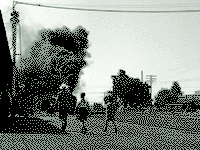November 2, 2008
White Farmers on Radio Qman Txun Swim 12 Hours For Land
ShareThis
A tourist left behind on a dive trip swam all night, covering nearly 10
kilometers through shark-infested water before reaching land in Taveuni,
Fiji Monday.
If there’s a model of hope for the world’s indigenous peoples, it is the
town of Todos Santos Cuchumatan in northwestern Guatemala. The Mayans who
live here still wear their traditional clothing with pride and practice
their traditional ceremonies and customs, and 95 percent of the population
still speaks Mam. At the same time, the people of Todos Santos also
participate vigorously in the larger society and have a thriving economy.
Some white farmers whose land was acquired by the Government for
resettlement purposes have reportedly destroyed maize fields belonging to
new farmers in Mashonaland West, claiming that the land was theirs.
Thomas Holz, 40, of Berlin, Germany, was out a scuba diving trip with three
other tourists at Rainbow Reef, near Viani Bay in Vanua Levu, according to
the local Fiji Times.
The key to this indigenous success story is Radio Qman Txun, the town’s
community radio station. The station’s programs reinforce the local
language and the culture while also bringing news from the nation and the
world into the town. The station is all the more important because the
whole country of Guatemala is flooded with Western music, information, and
cultural standards, and without Radio Qman Txun, those influences would
quickly overwhelm the town.
He surfaced after running out of oxygen and waited for the dive master to
return with the other divers. A local police spokesman said that when the
dive master resurfaced with the other tourists, they couldn’t find Holz.
They searched until nightfall, and began again early at 5 a.m. Monday.
At least two new farmers who had done dry planting had their germinating
maize crop destroyed recently. It is said that the white farmers are
refusing to vacate the land and to recognise the new farmers’ offer
letters. One new farmer Colonel Tony Kapanga said he lost over 20 hectares
of his maize crop on Wednesday after the former owner of his Chingford Farm
in Selous Mr Colin Cloete allegedly ploughed the land. He said he also lost
billions of dollars worth of fertiliser he had applied to the crop.
“The currents were strong, and my main fear was for my family in Germany.
Even though I was tired, I hung on to the oxygen cylinder and kept
swimming,” Holz told the Fiji Times. “Then early this morning, I felt the
seabed and just screamed out for help before I collapsed on the shore.”
But Radio Qman Txun, along with all the other community radio stations in
Guatemala, is at extreme risk. Elements in the government do not want these
stations to succeed. In past few weeks police have raided four radio
stations near Todos Santos and confiscated all the equipment. The country’s
constitution guarantees the right to community radio, but the
telecommunications law does not, and government forces are using the
pretext of this law to shut down the stations and cut off this vital
cultural lifeline.
Police at Selous confirmed the incident saying they had opened
investigations into the matter. When contacted for comment Mr Cloete said
he had ploughed down the maize seed because Col Kapanga was not supposed to
be on the farm. “Selous Police have recorded my statement and are charging
me with malicious damage to property but when Mr Kapanga was disturbing me
no one came to my rescue. This is my farm and the house in which the police
details are housed is my father’s house, so how do you explain this,’’ said
Mr Cloete.
A local woman heard his cries and helped him from shore. Holz has recovered
and is continuing his tourist activities on an eco tour.
This assault on Mayan culture has to stop, and right now we have a unique
chance to do it: a new telecommunications bill has been introduced in the
Guatemalan Congress, and recent elections resulted in 94 of the 158 members
of Congress being new. We have a very short window of time to reach these
new legislators before they are swamped with conflicting agendas. And the
math is all too simple: for the new bill to pass, 80 legislators must vote
for the bill. Currently, we have the support of 24; we need 56 more.
At Maunze Farm in Darwendale employees of one Mr J S Crowley allegedly
ploughed down more than six farmers’ fields which had maize seed. One of
the affected farmers Mr Roy Chinanga claimed he had nine hectares of maize
destroyed by Mr Crowley’s managers. “I used seed from last year’s reserves
but that has now been ploughed down and I do not have anywhere to turn
to,’’ said Mr Chinanga. Mr Crowley could not be reached for comment as he
was said to be living in Harare.
November 1, 2008
Secret Sand Thieves on Lagos-Ibadan Expressway Rampage as Toll in India’s northeast explosions rises to 77
13 hours ago
The level of sophistication in the bombings that killed at least 76 people
in northeastern India indicate that local militants had help from other
terrorist groups to carry out the attacks, officials said Friday.
Caribbean round grains, favored in creating smooth surfaces for plastering
and finishing, are being hauled away by the truckload late at night. On
some islands not much bigger than Manhattan, towns and ecologically
sensitive areas are now exposed to tidal surges and rough seas.
For over 40 minutes, armed robbers were on the rampage on the Lagos-Ibadan
Expressway in southwest Nigeria on Thursday, snatching vehicles and other
valuables from commuters.
The scale and planning behind Thursday’s 13 coordinated blasts in Assam
state surprised authorities, who struggled to determine who was behind the
attacks — among the worst ever in a region plagued by separatism and ethnic
violence.
The Director of US National Intelligence today disclosed the 2008 budget
for the National Intelligence Program: $47.5 billion. That
figure does not include spending for the Military Intelligence Program,
which is at least another $10 billion.
The death toll in the explosions rose to 77 on Friday after more than a
dozen people died from their injuries overnight, said Subhas Das, the
state’s home commissioner. More than 300 people were wounded.
In Puerto Rico, thieves once mined the dunes in the northern coastal town
of Isabela, said Ernesto Diaz of the Department of Natural Resources. But
now they are stealing the beaches of the tiny island of Vieques _ 52 square
miles where the U.S. military only recently halted its controversial
bombing practice.
Top government officials in Ekiti State became targets of armed robbers as
three of them have lost their cars to the bandits.
Assam state Inspector General of Police Bhaskar Jyoti Mahanta said the
state’s largest separatist group, the United Liberation Front of Asom, was
the main target of the investigation, but he added that the sophistication
of the blasts suggested the rebel group was “assisted by a force who has
adequate expertise in such attacks.” He did not elaborate.
Among the hardest hit is Grenada, where officials are building a $1.2
million seawall to protect the 131-square-mile island. Large-scale sand
thefts have exposed north-coast towns to rough seas, said Joseph Gilbert,
the minister of works and environment.
No fewer than 10 cars have been snatched in the past two weeks in which the
victims were held hostage at gunpoint before being made to part with their
valuables.
Anjan Borehaur, a spokesman for the United Liberation Front of Asom, denied
his group had any role in the blasts.
One of the region’s largest sand thefts targeted Jamaica, where nearly 100
truckloads were swiped from private property in the northwest, exposing
protected mangroves and a limestone forest to wind and waves.
Among the high-profile robbery victims are the Commissioner for Local
Government and Culture, Prince Biodun Bamiteko, Commissioner in the State
Universal Basic Education Board Iyabo Babatunde and the Permanent
Secretary, Establishment and Training Lekan Ayeleso.
The separatist group has never carried out an attack of this size and
complexity, which closely resembled bombings that have rocked other Indian
cities this year. Those attacks were blamed on well-financed and well-armed
Islamic militant groups.
Roughly 706,000 cubic feet of sand were taken in late July, enough to fill
roughly 10 Olympic-sized pools, said Jamaica Mines Commissioner Clinton
Thompson, who suspects government officials were involved.
Bamiteko and Babatunde were robbed of their Toyota Camry and Toyota Avensis
2008 model cars at gunpoint.
Federal investigators and forensic experts sifted through the rubble of the
blasts Friday for clues.
“I was surprised at the amount,” he said. “This one could not have been
stolen without persons knowing about it.”
Ayeleso’s home at Ado-Ekiti GRA was attacked by robbers who made away with
his car and other valuables.
Mahanta said that preliminary investigations indicated the militants had
used PE-3, a complex plastic explosive.
Police have refused to comment on their investigation.
Babatunde told reporters Thursday that five armed robbers broke into her
home at about 8 p.m. (1900 GMT) on Sunday and in the 45-minute operation,
made away with her Toyota Avensis car, money and other valuables.
On Friday, police fired rubber bullets to disperse angry mobs who took to
the streets of the state capital, Gauhati, stoning and attacking vehicles
and buildings, said C.K. Bhuyan, a local magistrate.
Illegal sand mining in the Caribbean began in the 1970s, when people with
shovels stole small amounts for construction because most homes were built
with wood. But the thefts increased as builders switched to concrete homes
and have only gotten bigger with the rise in construction of resorts and
hotels _ built, ironically, for tourists drawn by the Caribbean’s
immaculate beaches. An estimated 80 new hotels and resorts are expected to
open in the Caribbean through 2012, according to Smith Travel Research.
She said many houses in Ado-Ekiti GRA were raided with some of the
residents beaten up.
Similar incidents had taken place on Thursday.
Some islands offer local quarries or designate certain beaches for mining,
but large-scale nighttime thefts persist despite police patrols. Front
loaders and other heavy equipment are now used instead of shovels to steal
sand, which sells for nearly $200 for 1 cubic yard.
The increasing wave of robbery in Ado-Ekiti has also affected night life as
many fun-seekers now go home early so as not to fall victim of the robbers.
“If we continue to mine the beaches the way we’ve been doing, we will have
no sand to boast about. Just sea and sun,” Gilbert said.
A curfew was imposed in parts of the city on Friday, Bhuyan said, adding
that no one was injured when police fired rubber bullets.
National Chairman of the Action Congress (AC) Chief Bisi Akandeand his
wife, were among those who ran into the armed bandits at Sapade,
Isara-Remo, Ogun State around 9 a.m. (2000 GMT).
No one knows how much sand in all has been carted away, but the islands of
Tortola, Anguilla and St. Vincent are now vulnerable to flooding, said
Gillian Cambers, associate researcher at the University of Puerto Rico. Up
to two-thirds of sand dunes in Tortola and Nevis have been decimated, she
added.
The bombs were planted in cars and rickshaws, and the largest explosion
took place near the office of Assam’s top government official, leaving
bodies and charred, mangled cars and motorcycles strewn across the road.
He had left Ibadan, the Oyo State capital, for Lagos to attend the swearing
in of local government chairmen by Governor Babatunde Fashola (SAN). He
missed the ceremony.
On Grenada’s 13-square-mile Carriacou island, population 6,000, the beach
is shrinking by 3 linear feet every year from illegal sand mining, Gilbert
said.
Bystanders dragged the wounded and dead to cars that took them to
hospitals. Police officers covered charred bodies with white sheets in the
street.
Amid sporadic shootings, there was commotion as vehicles on the other side
of the road turned back.
In Barbuda, illegal sand miners dug a 23-foot crater that damaged a
freshwater aquifer. Saltwater seeped in, and droppings from cows and
donkeys contaminated the exposed aquifer, which is now unusable, said local
environmentalist John Mussington.
India’s northeast — an isolated region wedged between Bangladesh, Bhutan,
China and Myanmar with only a thin corridor connecting it to the rest of
India — is beset by dozens of conflicts. More than 10,000 people have died
in separatist violence over the past decade in the region.
In panic, many abandoned their vehicles and ran for cover in the nearby
bush.
Hurricane damage also has bumped up demand for sand, with residents using
concrete blocks to rebuild homes and sand to finish them, according to the
government of Antigua and Barbuda.
In October, more than 50 people were killed in violence between members of
the Bodo tribe and recent migrants to the area, most of whom are Muslims.
There was wailing on the road as the armed robbers seized car keys,
molested drivers and forced people to part with their money and other
belongings.
If caught, thieves face light fines and jail time that critics say are
unequal to the crime. Grenada, for example, imposes up to $190 in fines,
less than the cost of a single load of sand.
The region is also home to dozens of separatist groups who accuse the
government of exploiting the area’s natural resources while doing little
for the indigenous people — most of whom are ethnically closer to Burma and
China than to the rest of India.
Akande, who was stuck in the hold-up, was quickly spirited away by his
security aide as the robbers advanced on his vehicle. He took cover in the
bush. The former Osun State governor said although he had witnessed
robberies in the past, he had never seen armed robbers at a closer range.
“One could go out, engage in sand mining, pay all the fines and … still
come out making a profit,” said Randolph Edmead, director of St. Kitts’
planning and environment department.
“But today we really ran into them and we saw them face-to-face. My
security assistant advised me not to wait to confront them face-to-face,”
Akande said.
Grenada legislators expect to triple that amount and extend prison terms
from three months to two years. Jamaica also plans to approve new maximum
fines of $11,000 and allow police to seize sand-mining equipment.
“I saw people wailing and running towards me when I looked up and I saw
many cars turning. But, before we could turn, many vehicles were behind
us,” he said.
Some islands have considered importing sand to replenish their beaches, but
say it is expensive and worry about shifting the problem elsewhere.
Akande said he escaped into a wet bush close to a river, with insects
swarming all over him.
Gilbert said he is “appalled” and called for more oversight to prevent loss
of the region’s treasured shores.
He also said respite came about 40 minutes later when policemen arrived
after the armed robbers had left.
“We should take action now,” he said. “Or otherwise we will lose our
beaches.”
—–








